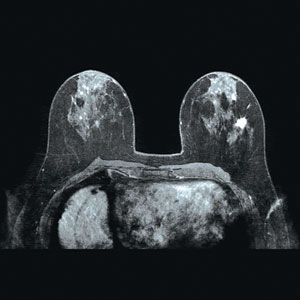Breast MRI is another imaging exam that can show abnormalities sometimes not demonstrated by either mammography or breast ultrasound. Breast MRI uses no ionizing radiation, like in mammography. For further details on MRI exams in general, please click MRI scan. Breast MRIs with Synergy Radiology Associates can be performed to further evaluate your breasts if you have recently been diagnosed with breast cancer. It can also help to see how you are responding to your breast cancer treatment. Breast MRI is an excellent screening test for patients that are considered high risk for developing breast cancer (based on family history, if you have had a genetic test showing you are BRCA positive, and other genetic conditions). Women with dense breast tissue can also be screened with a breast MRI. Breast MRI is also used if there is concern your breast implant is damaged or ruptured.
How do I prepare for my Breast MRI exam?
Preparing for a breast MRI is similar to other MRI scan preparations. For further details click MRI scan.
Unless instructed otherwise, take your normal medications and follow your standard diet. A two-piece outfit is recommended as you will need to remove the top of your clothing and bra prior to the exam. You will be given a gown that you can change into. Since the exam takes place in a large magnet, please leave jewelry at home as most items cannot be brought into the MRI unit. Makeups with metal could rarely heat and cause discomfort so it is advised to not wear them on the day of your exam. Your SRA technologist will go over an MRI safety questionnaire in detail with you. Notify the technologist if you have an implanted medical device such as a spinal stimulator or pacemaker, metal in your body, aneurysm clips, or artificial heart valves. If you are known to suffer from claustrophobia, you may want to talk to your referring physician about prescribing you some anti-anxiety medication to take prior to the exam. Be sure to speak with your referring physician about the risks/side effects of the medication, as they may impair driving or other operational functions necessary after the exam is completed. Oftentimes, claustrophobia is less problematic for breast MRIs as you are lying on your stomach during the entire exam.
What can I expect on the day of the exam?
After you check-in, an MRI technologist will escort you back to the MRI suite. You may be asked to complete additional breast-related questionnaires. Breast MRIs being performed for purposes of breast cancer screening, staging and treatment response will use IV contrast, administered through the arm or hand. If you have a history of kidney disease a blood test may be necessary (performed while you wait) to determine if it’s safe for you to have IV contrast. The technologist will help position you for the MRI. You will be lying on your stomach with your breast(s) placed into openings of a moveable MRI table. You will be made as comfortable as possible before being placed into the magnet, as it is very important you hold as still as possible. You will be offered earplugs or headphones, if desired, to help with the loud “knocking” sounds made by the MRI machine during your exam. The technologist will then place you into the magnet and begin the exam, giving you instructions throughout the test. Although you will be alone in the magnet of the MRI unit, the technologist will be able to see and hear you the entire time making it very simple to assist you if you have any problems or concerns. If your breast MRI requires IV contrast, the technologist will tell you before the injection. This is usually painless although you may feel a cool, flushing sensation during the injection. The entire MRI scan can typically take between 30 minutes to 1 hour depending on the reason for the exam and if one or both breasts are being scanned.
Synergy Radiology Associates offers Breast MRI services at many of the 20+ locations we operate out of throughout the Houston area including Katy, The Woodlands, Cypress, Humble and Friendswood, TX. Call the individual location to schedule or ask your primary care physician for a referral.

